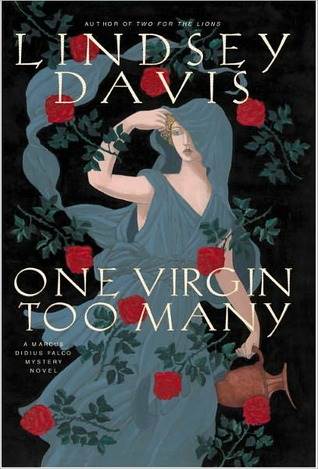
One Virgin Too Many
Marcus Didius Falco Mystery Series, Book 11
کتاب های مرتبط
- اطلاعات
- نقد و بررسی
- دیدگاه کاربران
نقد و بررسی

November 20, 2000
"I seem to be hearing about nothing but religious cults this week," says Marcus Didius Falco--the Spenser of Ancient Rome--early on in this 12th entry in Davis's popular series. And indeed details of the weirder practices of Roman worship take up much (some might say too much) of the book's story. Falco himself has been rewarded for his lucrative work as a census taker with the dubious honor of looking after the Emperor's sacred geese--including cleaning up their droppings. Aulus, the younger brother of Falco's highborn lover, Helena, is trying to join a prestigious agricultural/fertility sect called the Arval Brothers. And several young girls, including Falco's own niece, are caught up in the selection of a new Vestal Virgin--which sounds in Davis's version like a children's beauty pageant straight out of the JonBenet Ramsey case. Falco has to put aside his goose-watching and reclaim his day job as private informer when (1) Aulus discovers a mutilated corpse at the Arval Brothers' bucolic retreat and (2) one of the leading Virgins--who tried to hire Marcus because she thought her family was trying to kill her--disappears. As usual, Davis shows us many ways in which Ancient Rome was both the same as and different from our own times--although the research isn't as seamlessly integrated as before. And Falco, while still an interesting mix of ambition and democracy, doesn't have that true ring of a real Roman coin he once had.

September 1, 2000
Marcus Didius Falco has come a long way since Silver Pigs, the first book in this excellent series. For years he has been scraping along as an underpaid "informer" in first-century C.E. Rome, but suddenly his service to the emperor (as detailed in Two for the Lions) has won him an elevated post: Procurator of the Sacred Poultry, i.e., he tends the city's sacred geese. But trouble keeps coming his way: a wealthy little girl named Gaia wants to hire him, claiming that someone in her family wants to kill her, while his surly brother-in-law Aelianus has stumbled over a corpse at the rites of the Arval Brothers, a select society he hopes to join. The corpse then vanishes. Soon, it turns out that Gaia is the grand-daughter of a former chief priest, that her great-aunt is a former vestal virgin, and that Gaia was in the running to become one herself--until she disappears. Of course, the case of the missing girl and that of the missing corpse cross, and the mysteries surrounding both are solved, though one feels here that Marcus is a bit slower on the uptake than usual and a bit too talky about other issues. Nevertheless, for sharply etched characters, wry humor, and a powerfully evoked Rome, this historical can't be beaten. For most collections. [Previewed in Prepub Alert, LJ 7/00.]--Barbara Hoffert, "Library Journal"
Copyright 2000 Library Journal, LLC Used with permission.

October 1, 2000
Reading Davis' hardboiled Roman caper series (this is her eleventh) starring a tough-talking Roman informer is like hearing Sam Spade crack wise around the Emperor Vespasian. There's something jarring about an ancient Roman sounding as if he's channeling Edward G. Robinson. Davis' gumsandal hero, Marcus Didius Falco, has just gotten a reward: Vespasian has appointed him Procurator of the Sacred Geese, a sinecure that allows him entrance into the world of Roman cults. This knowledge comes in handy when a well-born little girl, slated by her family to be a Vestal Virgin, disappears after telling Falco her family is trying to kill her. The girl's disappearance coincides with a brutal murder stumbled upon by Falco's brother-in-law. A history mystery that is long on action and short on historical detail; a fun read, but not as richly researched and convincing as the Roman mysteries of John Maddox Roberts and Steven Saylor.(Reprinted with permission of Booklist, copyright 2000, American Library Association.)

























دیدگاه کاربران